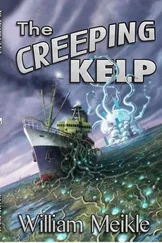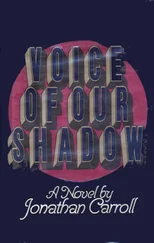“Yes…I’m a great believer in late-night shopping,” Lockwood said. He scratched at his lopsided wig and eyed the knife. “I see that you aren’t.”
“I’m a believer in giving intruders what they deserve,” Adelaide Winkman said. “What did you want here?”
“We’ve been waiting to offer you some choice articles,” Lockwood indicated his satchel. “I must admit, I’m not wildly impressed by your service. I’ve a good mind to complain.”
The woman’s eyes flickered toward the rubble, and the iron line. Down in the dark behind us, the shape moved. “Isn’t there someone in the tunnel to take care of you?”
“Well, yes. Bit uncommunicative, I found. Doesn’t say much.”
“No, but very attentive, from what I understand.” Adelaide Winkman gestured with the knife, and once again I found myself wishing ardently that we hadn’t left our rapiers behind. “Why not run away into the tunnel? He’ll see to you very quickly, I’m sure.”
Lockwood nodded. “Or, possibly, we could stay here, talking with you.”
Mrs. Winkman held up the knife and tilted it, so that its fine edges caught the light. “I wasn’t always in the antiques business, you know.”
“Weren’t you?”
“No. I used to be a butcher. This is a slaughterman’s filleting knife. I became quite proficient with it, a long time ago. Used it on all kinds of livestock—and other things.”
“Fascinating.” Lockwood took off his wig and ruffled his hair distractedly. “I had some other jobs, too, when I was younger. Delivered papers, washed cars…Sometimes I used to kick big women in the backside. That wasn’t paid work; I did it just for laughs. I bet I haven’t lost that knack, either. We could talk about this all night.”
She moved closer. “It’s the tunnel or the knife. I’ve a short fuse when it comes to snoops and interferers, as you’ll soon find.”
Lockwood smiled. “ Snoop? Interferer? I protest at that description.”
“You think it inaccurate?”
“Oh no; I’m both of those. But I’m an agent , most of all.”
The woman shook her head. “An agent has his rapier. Tonight, you have nothing.” She signaled to the men beside her. “Climb up and seize them.”
“Agents have other weapons, too,” Lockwood said. “Such as these.” He rummaged around inside his wig and brought out two magnesium flares; they’d been concealed there ever since he’d left Portland Row. He threw the first one at Adelaide Winkman’s feet. Even as it dropped, he was spinning, hurling the second into the tunnel, in the direction of the ghost. Then he pulled me to him.
For an instant we stood at the top of the mound, clutching at each other while the world exploded around us. Twin eruptions of fire on either side. Hot iron spattered against our clothes; we were buffeted first one way, then the other. Plumes of silver smoke billowed up at us, broke against our bodies, merged, and darkened into gray.
It all took three or four seconds, tops. Then we pulled apart, turned, and skidded down the mound into the tunnel. Screams sounded from the platform, but the silence up ahead was absolute.
The flare had done its work; the hovering shape was gone. Our boots rattled on dry gravel. The tunnel curled away. I scrabbled in my bag for a little flashlight. Every now and then I switched it on, watching the curve of the tracks, so we didn’t run into the walls. Almost at once I noticed how cold it had become since crossing the iron line. The tracks were sparkling with ice now; the black gravel glittered with it. Our breath was frost. The sound of our panting echoed off the walls.
“Lockwood,” I said, “the chill .”
“I feel it, but we’ve got to keep moving.”
Behind us, around the bend in the tunnel, we could hear the sounds of reluctant pursuit—heavy boots stumbling over rubble, Adelaide Winkman’s voice urging them on.
“They’ll have defenses against the ghosts,” I gasped. “They’ll drive us straight into—”
I didn’t need to say it. We were getting close to the site of the train accident. You could feel the psychic pressure mounting, and sense presences very near.
“Maybe there’ll be a side tunnel,” Lockwood muttered. “They had them sometimes. If we could branch off, get away from this…” He gave a cry. “Switch that flashlight off!”
My light had picked out a cavity in the right-hand wall, a blank, flat recess where workers could shelter from the passing trains. But there was the suggestion too of white things jumbled among the dust and rubble. I switched off the flashlight. We kept on walking.
“Were those bones?” I whispered.
The answer hung in the dark ahead of us: a thin gray shape, a smear of shadow. Another Shade.
“It looks inert,” I said. “Maybe it doesn’t see us. Hold on, no—it’s moving.”
Lockwood cursed. “This isn’t good. If only we had something we could use”—he clicked his fingers—“for protection ….Of course! Maybe we do. ” He stopped dead.
“What are you doing ?” I hissed. “We need to move.” I could hear boots some way behind us, slipping on gravel.
“Here. Stand close. Shine the flashlight on the ground.” He had torn his bag open, pulled out his spirit-cape. With a shake of the hand, he let it unfold. Purple-blue feathers shimmered on their silver network. Like a conjurer completing a trick, he whirled it up and around so that it fell over me, soft and downy. Then he raised its hood to cover my head.
“When the medicine men went into the spirit houses to talk to their ancestors, they wrapped themselves in these,” he said. He was looking in my bag now, getting out the second cape, wrapping it around himself. “We should do the same.”
“But we’re not going to talk to our ancestors!”
“We don’t know what we’re going to do, Luce. But it certainly won’t do any harm. In fact—am I imagining it, or has the cold lessened already?”
“I suppose it has, a bit. What’s the Shade doing?”
“Nothing now. It’s just standing there. Don’t know if it’s the capes or not. But it’s not attacking, which is good. Come on, we’ve got to run. They’re coming.”
Keeping our capes pulled tightly over us, we jogged down the tunnel, even as Winkman’s party came into view. There were shouts of excitement as they saw us, then a shrill cry of alarm—someone had noticed the ghost. The clatter of boots abruptly stopped; their whispered discussions resounded behind us as we hastened on.
“Won’t delay them long,” Lockwood said. “But I can’t believe those adults are going to want to go much farther. Oh…Oh no.”
All at once we had emerged into a higher, wider space.
In some ways it resembled the areas of Vauxhall Station we had left behind. The rails curved around ahead of us beside the beginning of an open platform; steps led up to it from the trackside. Not far along, however, the platform was choked with dusty gray chunks of rubble, rising right up to the broken ceiling. There were no arches or doorways in the walls. The way was clearly blocked.
And the track was blocked, too. By a train.
Even in my flashlight beam, it was black. Whether it had been the gas explosion itself, or the fire that ran through the cars afterward, or even the corrosion from long years being buried underground, the surface of the metal was dark and pitted. From the angle where we stood, we could see the back of the first car, the door hanging open, the charred stubs of the first few seats.
“It’s the one,” Lockwood breathed. “The train from the disaster.”
With the capes still draped over us, we edged out of the tunnel to the platform steps. From here the damage wrought on the train was even more evident. Halfway along, where it was embedded in the rubble, the entire central section of the train’s roof had been crushed as if slammed by a giant fist. One wall had burst outward. Portions of metal curled up from the rubble on the platform like the ribs of some prehistoric beast. The train was silent, empty, its windows twisted in agonized contortions.
Читать дальше









